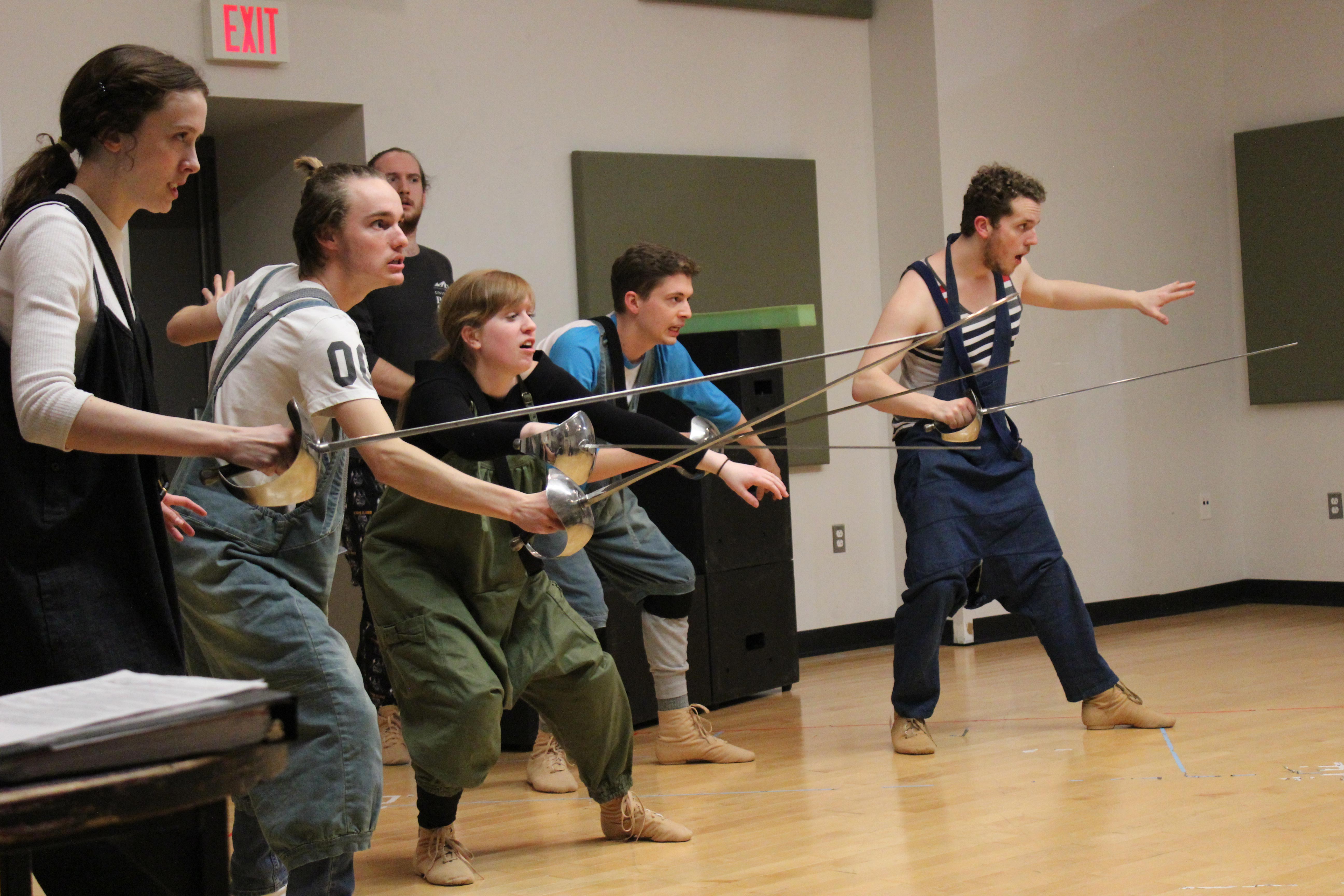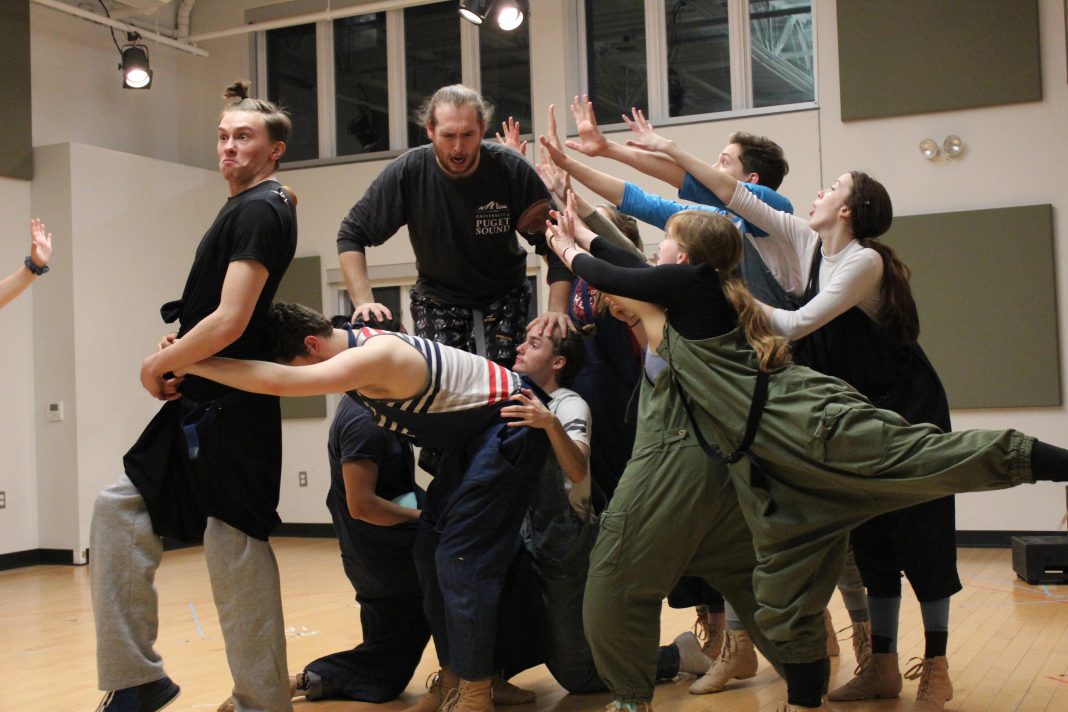If I had to describe what I predict the upcoming Ubu Roi, or king Ubu for those without google translate, I wouldn’t, and that would be the best way to describe it. As an absurdist production, it is not meant as a work to be predicted, but rather, one which disregards the logic of the time. This style of theatre, known as Dadaism, emerged in the early 1900s. Almost every scene in this play builds on the one before, escalating the craziness like the set’s impossible staircase, always finding more ways to undermine your expectations. An important aspect of this play to understand, is that it is also a very dark commentary on the suffocating greedy quest for power. To make a theatrical analogy: it’s like the chronicle of a more successful Macbeth—a Macbeth wearing a mask, but one with a very large nose.
You may find this play to be evocative of our current political climate, and this is done very much on purpose. In the official statement released with this play, Professor Francine Roussel, director, compares King Ubu’s reign over Poland to the current U.S. Administration. “I personally think that we need a show like this to start a dialogue,” said Gabi Adamo ’18, who plays Mother Ubu, Ubu Roi’s partner in crime. Adamo continues on to emphasize the fact that this play was written over 100 years ago and so, while it is political, it isn’t a specific enough script to really take a literal stance on what is occurring right now. “… It’s not that if you’re pro-Trump then don’t come see this show. [The show] is creating a dialogue of the actual leadership choices that a dictator would make in these circumstances.”
This play is not just another anti-Trump message: it brings issues of greed and corruption to the forefront of people’s minds, issues that have been around for as long as we can remember. “This play is also a testament of what power does to people,” Mike Poyntz ’20, a member of the unusually active ensemble, explains. “You can make connections to different oppressive policies that all presidents have made …There are some decisions in here that you can connect to all leaders across the world, including our own previous presidents.” The character of King Ubu is one that everyone can find a real life example of, whether it be President Trump or any other political figure that someone disagrees with. It’s with this in mind that I would like to stress that the intentions of the cast and crew should not stop you from coming to this production because you will find at least one of King Ubu’s escapades to tie you into the illogical world of the play.

With the political disclaimers out of the way, here’s a detailed analysis predicting all the reasons you should come see this play. If you’re like me, it’s been quite a while since you’ve seen a theatrical production that actually embraces the fictional realm that it resides in, disposing of this world’s laws of physics as unnecessary baggage, and wallows in its own disregard for the mental capacity of the mere mortals who watch it. Sure, absurdism isn’t for everyone, but from the energy and the enjoyment that I saw from cast during a rehearsal, I am confident that throughout the full show even the most juvenile or mature audience members will be constantly entertained, and when entertainment is done right like it is here, is there really anything else that you need?
In my experience, one of the most common pitfalls that satirical plays can be afflicted by is the concept of meta-acting. When performing in a way that is meant to mimic and mock another form of art, people usually have a tendency to act to the role instead of the action as is typically preferred. This creates a veil that can be hidden behind by discounting all flaws with the production as intentional commentaries on the common issues with whatever is being parodied. However, this is not a problem that we’ll be seeing in Ubu Roi, not under the watchful eye of the director or the experienced, veteran actor cast. Just because the play is fantastically absurdist doesn’t mean that the acting should break away from the realism we’ve come to expect from all modern day theater. This of course adds to the humor of the play; for instance, the only thing funnier than an extravagant buffoon waving around a toilet plunger is when he’s a merciless dictator wielding his malevolent king’s scepter.
I think my favorite aspect of this play can be summed up by a something I overheard Francine Roussel, the director, saying to one of the cast members during the rehearsal: “In this play, we don’t question anything.” This is counter-intuitive because in theater, much like any other academic work of interpretation, it is considered natural to question everything that is written down for it must, of course, hold some importance. What this little quote highlights is the extreme “roll with the punches” style that is present in many scenes in the play. Relying heavily on casting multiple roles for each actor, the play implements this unusual pillow-stuffing format where one actor can play different characters, each with a different exaggerated body type depending on the placement of the pillow. This becomes quite important when, over a matter of seconds all within the same scene, characters can be cut down dead, then the actor rolls off the stage and runs to the side of the set before re-entering as an entirely new character as if none of that double-casting shenanigans had occurred at all. I find this play to be theater at its free-est and finest, truly a show most anyone can enjoy and remain entertained by.
Ubu Roi will be reigning over the black box theater from Wednesday Feb. 21 until that following Sunday, with a panel discussion of Muhlenberg professors from every discipline talking about the meeting of politics and entertainment from 2 to 3:15 in the studio theater on Friday Feb. 23.
Ethan is a freshman with an intended neuroscience major and an eye for shiny things like arts and culture. Self plug for the MCEMS training corps, science journalism club, (maybe) the MCA, and many other non-writing based nerdy clubs, but most importantly he's a proud member of the A&C writing gang.






















